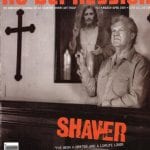Alejandro Escovedo – A seeker of the song, and of the truth in a song
ND: Since you’re a father yourself, has this play changed your attitudes about your own family and your role in it?
AE: Every time I see the play, it’s a really intense emotional experience — something I’d never really experienced before, from just writing songs and playing in clubs. Even though I’d written songs about my father, it was never as emotionally charged as this play was. Partly that’s from seeing images of my family onstage while we’re performing these songs. A lot of the narrative and dialogue is based on stories from my father.
The family ties become even stronger, even though some of them are strained. It brings everything back from childhood to where I am now as a parent. Part of the purpose of the play is not only to connect with our fathers’ roots, but to ask questions and learn from that. To carry on certain traditions, and hopefully improve on others.
I’m also in the middle of a separation from my family. So that’s kinda…weird. But it’s made me want to be closer to my children, and let them know who I am and why I’ve done the things I’ve done.
ND: It must produce a strange clash of feelings.
AE: Uh-huh. As a typical Latin male, and having lived with such strong women, I’ve left a lot of the connection with my children to the mothers. After Bobbi passed away [his previous wife, who committed suicide in 1991], and I was left to take care of Maya and Paloma on my own, I quit playing music for quite a while. And I remember once my father called me out of the blue — and he NEVER uses the phone; he’s hard of hearing, for one thing — to tell me how proud he was of what I’d done. That I’d stayed with my children and hadn’t given up what I loved to do, music. He told me, ‘I’m very proud of you because I never could’ve done what you’ve done.’
So while I see great strength in my father, I also see a certain old-school weakness in that men of his generation weren’t necessarily ready to take on the role of father. I was really sort of forced to. It changed my whole perspective on fatherhood. Motherhood, too, to be quite honest. But parenthood is really great. And it sets you up for being in bands.
ND: I would guess the interpersonal dynamics are a lot the same.
AE: Very similar, yeah.
II. IT CAN LEAD TO SOME PRETTY DARK PLACES
ND: Aside from the two songs that they have in common (“Wave” and “Rosalie”), did the play creep into A Man Under The Influence very much?
AE: Not really, and even the versions of those songs are quite different in the play from the record.
ND: Moving into specific songs, “Follow You ‘Round” is about the late Townes Van Zandt, right?
AE: It’s a song I wrote for Townes. Well, not for him so much as because of him. Inspired by him. What I was trying to say was, here’s a man who…I hate to use the word “muse,” but he was definitely a seeker of the song, and of the truth in the song. He paid a great price for that. He was obsessed. Without even really thinking about it, he just had to do it, and I love that about him. At the same time, the line in the song goes from “I’ll follow you ’round” to “I’ll follow you down.” It can lead to some pretty dark places.
ND: For the most part, though, this record doesn’t sound all that dark.
AE: No, I don’t think so at all. What I was looking for, working with Chris [Stamey], was to find more of a melodic bent to my songs. I tell people that this is a pop album, and it’s not, really. But in a way, it’s much more pop than my other albums. I wanted this one to be a little more accessible, although it does have the sort of songs I always do, like “Wave” and “Across The River”.
I think Chris is a fascinating creature, a mad genius. I loved the sound he got on the instruments on Bourbonitis Blues [Escovedo’s 1999 release on Bloodshot], and he was so supportive of my singing. On this record, I really wanted someone who would pay more attention to my vocals. Not just write me off as this guy who sings off-key. So I was really enthusiastic about the time we spent on vocals and lyrics and shaping songs. In my opinion, he’s not a real “performance” producer. I don’t know how to explain it, exactly. But what was important for me was to get my lyrics and vocals together, and Chris kind of shaped everything around them.




